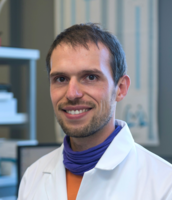Johannes Mayer
Immune mechanisms of chronic skin diseases in ageing

Dendritic cells are crucial for initiating adaptive immune responses, which are often linked to chronicity and disease severity. We found that skin-specific populations of dermal dendritic cells develop in response to unique properties in healthy skin. Due to changes in skin properties during ageing, dendritic cells might become more pro-inflammatory, fuel inflammation and contribute to skin barrier deterioration with age. We study the functional role of skin dendritic cells in ageing using pre-clinical models and patient samples. To gain a detailed understanding of these cells and their function, we employ high-dimensional single-cell technologies as well as in vivo, in vitro and in situ tools to address how skin dendritic cells drive or dampen local and systemic immune responses. Together with the CHA, we want to identify molecular pathways that might be linked to deteriorating dendritic cell function with age and find ways to reverse these effects as a novel therapeutic strategy to improve skin wound healing and suppress inflammatory skin diseases.
Positions held
- Since 2023: Group leader, Research Center for Immunotherapy, University Medical Center (UMC), Mainz
- Since 2023: Associate Professor for Dermatological Immunotherapy, University Medical Center (UMC), Mainz
- 2021 - 2023: Junior Group Leader, Phillips University Marburg
- 2019 - 2021: Project Leader, Malaghan Institute of Medical Research, Wellington
- 2017 - 2021: Postdoctoral Research Fellow, Malaghan Institute of Medical Research, Wellington
Education
- 2023: Habilitation/Venia legendi in Molecular Immunology, Phillips University Marburg
- 2013 - 2017: PhD in Immunology, University of Glasgow
- 2012 - 2013: Master of Research, University of Glasgow
- 2009 - 2012: BSc, University of Technology Munich
Selected publications by Johannes Mayer
Mayer JU, Hilligan KL, Chandler JS, Eccles DA, Old SI, Domingues RG, Yang J, Webb GR, Munoz-Erazo L, Hyde EJ, Wakelin KA, Tang SC, Chappell SC, von Daake S, Brombacher F, Mackay CR, Sher A, Tussiwand R, Connor LM, Ortega DG, Jankovic D, Gros GL, Hepworth MR, Lamiable O and Ronchese F (2021) Homeostatic IL-13 in healthy skin directs dendritic cell differentiation to promote TH2 and inhibit TH17 cell polarization. Nat Immunol, 23:985 Link
Bosteels C, Neyt K, Vanheerswynghels M, van Helden MJ, Sichien D, Debeuf N, De Prijck S, Bosteels V, Vandamme N, Martens L, Saeys Y, Louagie E, Lesage M, Williams DL, Tang SC, Mayer JU, Ronchese F, Scott CL, Hammad H, Guilliams M and Lambrecht BN (2020) Inflammatory type 2 CDCs acquire features of CDC1s and macrophages to orchestrate immunity to respiratory virus infection. Immunity, 52:1039-1056e9 Link
Ferrer-Font L, Mehta P, Harmos P, Schmidt AJ, Chappell S, Price KM, Hermans IF, Ronchese F, le Gros G and Mayer JU (2020) High-dimensional analysis of intestinal immune cells during Helminth infection. eLife, 9:e51678 Link
Giladi A, Cohen M, Medaglia C, Baran Y, Li B, Zada M, Bost P, Blecher-Gonen R, Salame TM, Mayer JU, David E, Ronchese F, Tanay A and Amit I (2020) Dissecting cellular crosstalk by sequencing physically interacting cells. Nat Biotechnol, 38:629-637 Link
Hilligan KL, Tang SC, Hyde EJ, Roussel E, Mayer JU, Yang J, Wakelin KA, Schmidt AJ, Connor LM, Sher A, MacDonald AS and Ronchese F (2020) Dermal IRF4+ dendritic cells and monocytes license CD4+ T helper cells to distinct cytokine profiles. Nat Commun, 11:5637 Link
